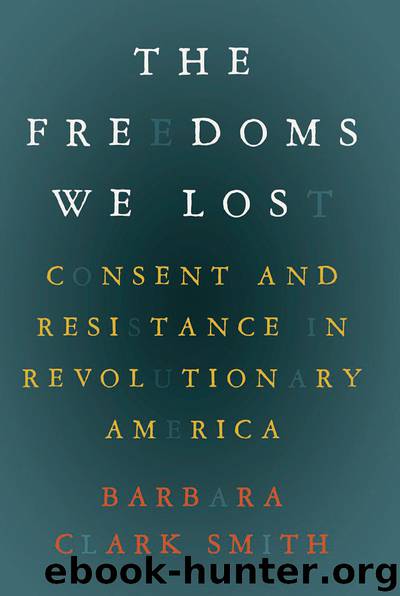The Freedoms We Lost by Barbara Clark Smith

Author:Barbara Clark Smith
Language: eng
Format: epub
Publisher: The New Press
Published: 2019-02-19T16:00:00+00:00
Modern readers may squirm at the dialect and wonder at some eighteenth-century meanings (“Jack he trash, he trash”).59 Still, it is clear that the author of “The Farmer Returning” expected readers to recognize Jack’s perspective as the plain and common sense of the matter. Jack posed common knowledge of fairness over and against the learned logic of the farmer and his family. The author of the drama assumed that it would not overstretch readers to allow an untutored, enslaved black man speak their part. Jack, unqualified for even the status of one of the “three disinterested men” called in to arbitrate disputes within a community, nonetheless could grasp the obvious: he could recognize avarice when he saw it. The character of Jack was accorded a capacity to pronounce on his master, the farmer who was “Lord over” Jack, as he might wish to be lord over his neighbors. Of all the figures who appear in “The Farmer Returning,” Jack came closest to qualifying as neighbor or Patriot. Here, in a New England publication, was a muted critique of slaveholding and a loud critique of the miserly well-to-do. Here was the specter of the magnificence of the farmer and the slavery of the many.
Nothing made the case that justice was recognizable to the most ordinary of men more strongly than the character of Jack. Yet in this literature of patriotism and prices, Jack was only one of a number of characters representing the relatively humble view of life and revolution. To read these pamphlets, newspaper pieces, and paragraphs in almanacs is to encounter soldiers, widows, hardworking tradesmen, and laborers, all of them with claims of justice to make. In some articles those claims were addressed to merchants, in others to farmers, as various authors variously identified the source of the problem; yet authors agreed on the core of the matter. Indeed, they could hardly think of it in other terms: the problem was social, a question of the relationships among social beings, all of them located, recognizable, identified as particular members within a larger whole.
With that way of casting the problem came obvious solutions that involved the participation of the many to set social relationships right. “The Farmer Returning” noted the crowds that sought popular justice against the miserly. One of the farmer’s sons looked over their bounteous store of provisions and noted that “town folks” might “rise and take this away.” Such crowds were unlikely to face punishment or even disapproval from leading men. “I doubt but the authority would justify them in it,” the son mused, a remark that could surely have been taken by some readers as provocation. In “The Farmer Returning,” an enslaved African American, food rioters, and the authorities of the state appeared in agreement and potentially allied. The author invoked a coalition that allied Patriot authorities with the people “out of doors,” acting in a mob and in agreement with the lowest class in the province. He described the first Patriot coalition at its broadest.
•
Download
This site does not store any files on its server. We only index and link to content provided by other sites. Please contact the content providers to delete copyright contents if any and email us, we'll remove relevant links or contents immediately.
| Africa | Americas |
| Arctic & Antarctica | Asia |
| Australia & Oceania | Europe |
| Middle East | Russia |
| United States | World |
| Ancient Civilizations | Military |
| Historical Study & Educational Resources |
Washington by Ron Chernow(818)
Patriot Pirates by Robert H. Patton(738)
James Madison: A Life Reconsidered by Lynne Cheney(727)
American Tempest by Harlow Giles Unger(711)
John Adams by David McCullough(683)
The Radicalism of the American Revolution by Gordon S. Wood(654)
George Washington's Secret Six by Brian Kilmeade(633)
Mary Ball Washington by Craig Shirley(629)
The Whites of Their Eyes by Jill Lepore(578)
Henry Knox: Visionary General of the American Revolution by Mark Puls(562)
To Begin the World Over Again by Matthew Lockwood(551)
American Revolution For Dummies by Steve Wiegand(551)
A Wilderness So Immense by Jon Kukla(546)
The First Conspiracy: The Secret Plot to Kill George Washington by Brad Meltzer & Josh Mensch(542)
The American Revolution: A History by Gordon S. Wood(539)
Poor Richard's Almanack by Benjamin Franklin(538)
Revolutionary Summer: The Birth of American Independence by Joseph J. Ellis(527)
The Federalist papers by Alexander Hamilton; James Madison; John Jay; Lawrence Goldman(500)
Paine, Thomas - Complete Works of Thomas Paine by Paine Thomas(497)
